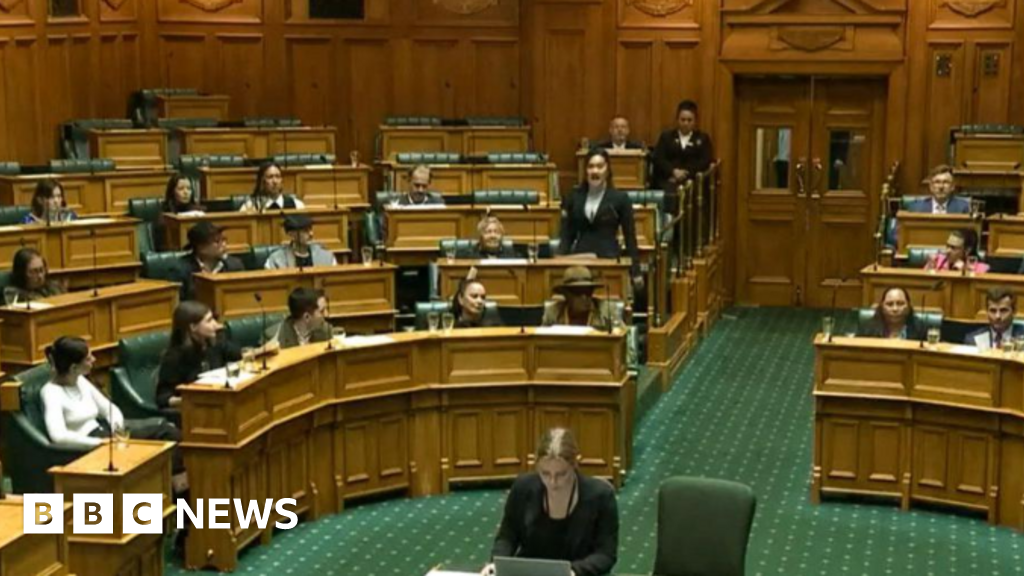ARTICLE AD BOX
By Adrienne Murray
Copenhagen
A historic impeachment trial gets underway in Denmark on Thursday against a former minister who spearheaded dozens of tough immigration measures.
Inger Stoejberg is accused of unlawfully ordering the separation of young asylum-seeking couples in 2016.
She is facing a landmark lawsuit, which accuses her of bearing responsibility for breaking the law.
It is Denmark's first impeachment case in almost three decades, and only the second held in a century.
Between 2015 to 2019, Ms Stoejberg served as Denmark's immigration minister in a centre-right government propped up by the right-wing populist Danish People's Party.
Under her watch more than 100 new restrictions were introduced.
Advertisements were taken out in Lebanese newspapers to deter refugees and rules around family reunification were tightened up, drawing criticism from the United Nations refugee agency.
After imposing 50 new immigration curbs, she stirred controversy by celebrating with a cake.
Among other headline-grabbing measures were the confiscation of valuables from asylum-seekers and a now-scrapped plan to send foreign criminals to an uninhabited island in the Baltic Sea.
Separation of couples
The impeachment case stems from an order Inger Stoejberg gave in February 2016, that married refugees under 18 years old must not be accommodated with their spouse.
Twenty-three married couples, some with children, were separated before the policy was dropped a few months later.
Among them were a young Syrian couple, Rimaz Alkayal, then 17 and her spouse Alnour Alwan, 26, who were reunited following a complaint. They had been forced to live apart for four months, even though she was pregnant.
It has been a long journey to Denmark's Supreme Court.
Inquiries by both the country's ombudsman and a special commission concluded that the separations were illegal. Requirements to individually assess or consult those affected had been ignored and breached human rights.
The "Instrukskommission" or Directive Commission also said that the former minister had been warned by staff that the practice was unlawful.
image sourceGetty Images
image captionAs asylum applications increased in 2015 Denmark tightened its immigration rulesTwo independent attorneys then determined there were grounds for impeachment, and earlier this year, a large majority of MPs voted in favour, including Inger Stoejberg's own party, the Liberals.
She resigned as deputy leader and quit the party.
'No basis for impeachment'
Ms Stoejberg maintains she was trying to protect girls and combat child marriage.
"Mistakes have happened in the case and those I have apologised for, but to me there is of course no basis for an impeachment," she wrote earlier on Facebook.
"My political wish was, is and will be that no child brides should live with their older husband at a Danish asylum centre. But of course I haven't given any orders to break the law."
The trial takes place at a special impeachment court and is likely to last until December. Thirteen Supreme Court judges and 13 appointees will decide if the former minister has violated the Ministerial Accountability Act.
"It's about her responsibility. Whether she actually instructed the administration to perform an illegal action, and whether she knew that's what she was doing," explains Jens Elo Rytter, a constitutional law professor at Copenhagen University.
Career in the balance
"Very rarely do we have impeachment trials in this country," says Prof Rytter. "It's the only trial you can have for a minister who has allegedly performed an illegal action in office."
This is only the sixth impeachment in Danish history.
Most have ended in acquittal. However, in 1995 ex-Justice Minister Erik Ninn-Hansen was handed a four-month suspended sentence for blocking refugees from Sri Lanka bringing their families to Denmark.
There's no chance to appeal. If convicted, she could face a fine or possible imprisonment.
Her political career also hangs in the balance and Prof Rytter believes Ms Stoejberg has a fight on her hands.
"If you read the conclusions of the investigative committee that have looked very, very carefully to this case, their conclusions are rather clear." he says. "On that basis, I would say I would be more surprised to see an acquittal than a guilty verdict."
Inge Stoejberg is currently an independent MP. But if she is convicted, there is little chance of her being allowed to stand for parliament again.
"This is a once-in-a-generation thing that's happening. This is going to be very impactful," says political analyst Kristian Madsen, who is editor-in-chief of A4 Medier.
In Denmark Ms Stoejberg is a divisive figure, but she's also a political heavyweight with a faithful following.
image sourceInger.dk/Facebook
image captionThe former minister has just launched a new website with videos and newsletters giving her views on the case"There's the traditional, nationalistic right wing that she obviously appeals to, but there's also almost a Trump-esque element to this," says Mr Madsen, who points to her strong social media influence. "She's become an anti-elite, anti-establishment figure."
Ahead of the trial she has this week launched a new website, offering paid subscribers exclusive videos and weekly newsletters with her views on her "political struggle for Danish values". She had sought to have the trial televised, which in Denmark does not happen.
"This is unheard of in Denmark," says Mr Madsen. "The message that sends to me is that she's going to be a voice in the political arena after this trial, no matter how it ends."

 3 years ago
332
3 years ago
332








 English (US) ·
English (US) ·